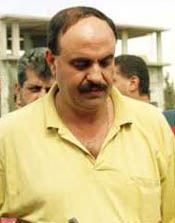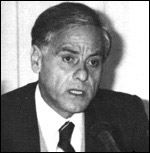Jointly published by the United States Committee for a Free Lebanon and the Middle East Forum
| Vol. 2 No. 2 | February 2000 |
Back to February 2000 Table of Contents
Back to Middle East Intelligence Bulletin homepage.
Assassination of Akl Hashem May Presage Demise of SLA
by Gary C. Gambill
 |
| Akl Hashem |
Hezbollah's assassination of Akl Hashem, a senior officer in the South Lebanon Army (SLA) who had been expected to succeed Gen. Antoine Lahad as commander of the militia, has thrown into question the future of the Israeli-occupied security zone. On January 30, a team of Hezbollah commandos detonated several bombs at the entrance of the driveway to Hashem's house on the eastern edge of Dibil, a small village 5 km west of Bint Jbeil. A videotape of the assassination broadcast by Hezbollah shows the bomb exploding just as Hashem was climbing into his white armor-plated Mercedes. The SLA's Voice of the South radio station later confirmed the assassination of Hashem by the "militia of the Iranian-Syrian enemy."1
Hashem had escaped several assassination attempts by Hezbollah in the past and had come to be known as "untouchable." However, a few months ago, a former SLA officer left the security zone and went to Paris, where he met with Syrian and Lebanese intelligence officers and provided them with valuable information about Hashem's movements and security precautions. This information was then forwarded to Hezbollah, which spent several weeks planning the operation. The assassination team apparently penetrated the heavily guarded region along a wadi (dry riverbed) running between Yater and Rshaf and then escaped under cover of mortar fire from Hezbollah units on nearby SLA outposts in Rshaf, Jammousseh, Qawza and Humayed.
Hashem, a Maronite Christian, was born in 1952 in Dibil, a village on the Israeli-Lebanese border. He entered the Lebanese army's school for non-commissioned officers at the age of eighteen and had attained the rank of sergeant at the time of the outbreak of the Lebanese civil war in 1975. In 1976, Hashem joined Saad Haddad's Army of Free Lebanon operating in south Lebanon with the support of Israel. After Haddad's death in 1984, the militia was reorganized as the SLA under the command of Antoine Lahad. Hashem was promoted to colonel and assumed command of the western sector of the security zone two years later. His brother, Youssef Hashem, also became a senior SLA officer. Hashem, who was also in charge of the SLA security service, was one of only three colonels serving directly beneath Lahad. The other two are Karamallah Said, the deputy commander of the militia, and Nabih Rifai, the commander of the eastern sector of the security zone. He will reportedly be replaced by Fares Qassis, the deputy commander of the western sector. Hashem is survived by a wife and five children.
 |
| Etienne Saqr |
According to sources in south Lebanon, several civilian political leaders in the south--most notably Etienne Saqr, the head of the Guardians of the Cedars party--had been pushing for the establishment of an autonomous Lebanese enclave in the security zone and the transformation of the SLA into a military body accountable to an elected multi-sectarian interim government charged with ruling the enclave until the withdrawal of Syrian troops from the rest of Lebanon. Hashem, the only senior SLA officer who was seriously considering remaining in south Lebanon after an Israeli withdrawal, had recently expressed interest in the plan. Many considered him the only person capable of pulling it off--he was very popular among the soldiers of the SLA's Western Brigade, which is composed of roughly equal numbers of Shi'ite Muslim and Christian militiamen. This popularity within both sectarian groups meant that he could have commanded loyalty from the SLA's rank and file even after the departure of Israeli forces later this year.
Moreover, Hashem, who was fluent in Hebrew, had a close rapport with Israeli officials and might have been able to secure their cooperation. Given the opposition of most Israeli military officials and politicians to leaving an intact militia behind after the pullout (Interior Minister Natan Sharansky may be an exception), Hashem's assassination is seen by some as the death knell of this project.
However, a vigorous lobbying campaign by the World Lebanese Organization in support of an autonomous south Lebanon enclave under U.N. protection is still underway in Israel and the United States. "The project is well known by the Israelis, both in government and in the opposition as well as by many members of the US Congress," said a WLO representative. "We have communicated those ideas to European governments as well including the British and Swedish governments." Earlier this month, Etienne Saqr reportedly visited DC to meet with several U.S. congressmen who support the proposal.
1 "Le Hezbollah élimine Akl Hachem, numéro deux de l'ALS," L'Orient Le Jour, 31 January 2000.
� 2000 Middle East Intelligence Bulletin. All rights reserved.
MEIB Main Page


